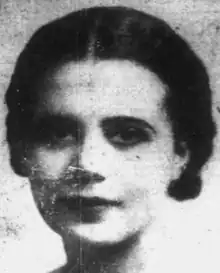Sara Pelham Speaks | |
|---|---|
 Sara Pelham Speaks, from a 1940 newspaper | |
| Born | November 7, 1902 Washington, D.C. |
| Died | August 23, 1984 New York |
| Occupation(s) | Lawyer, politician, activist |
| Parent(s) | Robert Pelham Jr., Gabrielle Lewis Pelham |
Sara Pelham Speaks (November 7, 1902 – August 23, 1984) was an American lawyer and activist. She was the first Black woman to be a major party's nominee for a Congressional seat, when she was the Republican candidate who opposed Adam Clayton Powell Jr. in 1944.
Early life and education
Sara Pelham was born in Washington, D.C., the daughter of Robert A. Pelham and Gabrielle Lewis Pelham. Her father was a lawyer and newspaper editor; her mother was a pianist, organist, music educator,[1][2] and founder of the Detroit Study Club. Her uncle was a noted civil engineer, Frederick Blackburn Pelham.[3][4] Her sister was Dorothy Pelham Beckley, the second national president of Delta Sigma Theta. Pelham graduated from Dunbar High School and from the University of Michigan in 1924, where she majored in chemistry,[5][6] and protested unequal treatment at a lunch counter near campus.[7] She completed a law degree at New York University in 1936.[8][9]
Career
Speaks helped her father organize the Capital News Service and worked as a journalist in Washington, D.C. after college. She ran for a seat in the New York State Assembly in 1937, and won her primary, but lost the general election by a small margin. In 1944, she ran as the Republican candidate[10] against Adam Clayton Powell Jr. for a new Congressional seat in New York City;[11][12][13] she lost decisively,[14] partly based on a campaign of rumors about her racial identity,[15] but she won the endorsement of the New York Amsterdam News, and was the first Black woman to be a major party's candidate for a Congressional seat.[16] The New York Amsterdam News framed her loss as holding the promise of future success: "The old precedent has been broken and the way opened for a Congresswoman from the ranks of Negro women. The future holds that."[17] She was disbarred in 1948, following accusations of misconduct.[8][18]
Speaks was active in the Urban League,[19] Delta Sigma Theta, the New York State Federation of Business and Professional Women's Clubs. She worked on Republican presidential campaigns in 1932, 1936, and 1940.[8]
Personal life
Sara Pelham married physician F. Douglas Speaks in 1926; they had one son. She died in 1984, aged 81 years, in New York.[8]
References
- ↑ "The Washington Conservatory of Music". The Colored American. 1903-10-24. p. 11. Retrieved 2022-02-28 – via Newspapers.com.
- ↑ "Mrs. Pelham Funeral Set for Tomorrow". Evening Star. 1947-02-25. p. 10. Retrieved 2023-02-22 – via Newspapers.com.
- ↑ Milgrom, Randy (2018-02-28). "Fred B. Pelham: building bridges". Michigan Engineering. Retrieved 2022-02-28.
- ↑ "4th graders honor first black UMich engineering graduate, bridge designer". mlive. 2017-12-30. Retrieved 2022-02-28.
- ↑ News by Classes. Vol. 51. April 28, 1945. p. 363. ISBN 978-0-19-934186-3.
{{cite book}}:|journal=ignored (help) - ↑ "Sara Speaks Heads East GOP Division". California Eagle. 1940-09-26. p. 3. Retrieved 2022-02-28 – via Newspapers.com.
- ↑ Walking in the Steps of Black Women: A History of the University of Michigan. Bentley Historical Library.
- 1 2 3 4 Gallagher, Julie (2013). "Speaks, Sara Pelham". Oxford African American Studies Center. doi:10.1093/acref/9780195301731.013.37923. ISBN 978-0-19-530173-1. Retrieved 2022-02-28.
- ↑ Gallagher, Julie A. (2012-06-15). Black Women and Politics in New York City. University of Illinois Press. pp. 63–64. ISBN 978-0-252-09410-1.
- ↑ "Hat in Ring". The Pittsburgh Courier. 1944-05-20. p. 1. Retrieved 2022-02-28 – via Newspapers.com.
- ↑ "U.S. At War: Harlem Choice". Time. 1944-05-22. ISSN 0040-781X. Retrieved 2022-02-28.
- ↑ "Mrs. Speaks to Enter Democratic Primary; Republican Choice Tells of Leaders' Support". The New York Times. 1944-05-13. ISSN 0362-4331. Retrieved 2022-02-28.
- ↑ "200 Women Form Nonpartisan Committee To Back Mrs. Speaks in Race for Congress". The New York Times. 1944-05-23. ISSN 0362-4331. Retrieved 2022-02-28.
- ↑ Walton, Hanes Jr.; Puckett, Sherman; Deskins, Donald R. Jr. (2012-07-20). The African American Electorate. SAGE. p. 403. ISBN 978-0-87289-508-9.
- ↑ Perry, Elisabeth Israels (2019-03-06). After the Vote: Feminist Politics in La Guardia's New York. Oxford University Press. ISBN 978-0-19-934186-3.
- ↑ "Republican Leaders Designate Sara Pelham Speaks for Congress". The New York Age. 1944-05-20. p. 1. Retrieved 2022-02-28 – via Newspapers.com.
- ↑ Smith, Elaine M. (2003). Mary McLeod Bethune and the National Council of Negro Women: pursuing a true and unfettered democracy. Alabama State University, for the Mary McLeod Bethune Council House, National Historic Site, National Park Service.
- ↑ "Mrs. Sara Pelham Speaks Disbarred in New York City". Alabama Tribune. 1948-07-09. p. 2. Retrieved 2022-02-28 – via Newspapers.com.
- ↑ "Heads Membership Drive for Urban League". The New York Age. 1942-02-21. p. 4. Retrieved 2022-02-28 – via Newspapers.com.
External links
- Sara Pelham Speaks, with Francis E. Rivers and James R. White, in New York City (1940), a photograph in the Schomburg Center for Research in Black Culture, New York Public Library